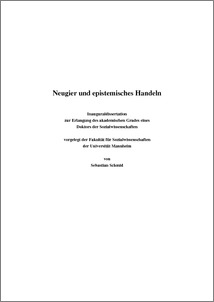|
Neugier und epistemisches Handeln
Schmid, Sebastian
![[img]](https://madoc.bib.uni-mannheim.de/style/images/fileicons/application_pdf.png)  Vorschau |
|
PDF
Schmid_Neugier2.pdf
- Veröffentlichte Version
Download (1MB)
|
|
URL:
|
https://ub-madoc.bib.uni-mannheim.de/2029
|
|
URN:
|
urn:nbn:de:bsz:180-madoc-20294
|
|
Dokumenttyp:
|
Dissertation
|
|
Erscheinungsjahr:
|
2008
|
|
Titel einer Zeitschrift oder einer Reihe:
|
None
|
|
Ort der Veröffentlichung:
|
Mannheim
|
|
Verlag:
|
Universität Mannheim
|
|
Hochschule:
|
Universität Mannheim
|
|
Gutachter:
|
Hofer, Manfred
|
|
Datum der mündl. Prüfung:
|
4 Juni 2008
|
|
Sprache der Veröffentlichung:
|
Deutsch
|
|
Einrichtung:
|
Fakultät für Sozialwissenschaften > Statistik u. Sozialwissenschaftliche Methodenlehre (Brüderl -2011)
|
|
Fachgebiet:
|
150 Psychologie
|
|
Normierte Schlagwörter (SWD):
|
Neugier , Intrinsische Motivation , Extrinsische Motivation , Metakognition , Selbstbeobachtung , Interesse
|
|
Freie Schlagwörter (Deutsch):
|
Epistemologische Überzeugungen , Lernstrategien
|
|
Freie Schlagwörter (Englisch):
|
epistemic curiosity , metacognition , self-perception , extrinsic motivation , epistemological beliefs
|
|
Abstract:
|
Spezifische epistemische Neugier ist ein motivationaler Zustand, der durch konkrete Fragen ausgelöst und durch Wissenserwerb befriedigt wird. In der vorliegenden Arbeit geht es um die Entstehungsbedingungen spezifischer epistemischer Neugier und die Charakteristika neugiermotivierten Handelns. In kritischer Auseinandersetzung mit vorhandenen Neugiertheorien wird ein integratives Modell entwickelt, dem zufolge Neugier auf der metakognitiven Erfahrung einer gesteigerten kognitiven Aktivität beruht. Derartige metakognitive Erfahrungen können fehlattribuiert werden, wenn ein extrinsisches Ziel vorliegt. Eine zentrale Implikation des Modells besagt daher, dass die Neugierentstehung durch übergeordnete Ziele bei der Auseinandersetzung mit Fragen gehemmt werden kann. Ableitungen aus dem Modell wurden in zwei Experimenten und einer Fragebogenstudie untersucht. Insgesamt sprechen die Ergebnisse der Experimente und der Fragebogenstudie dafür, dass die durch eine Frage ausgelöste kognitive Aktivität sich nur bei geringer Instrumentalität in Neugier niederschlägt. Die Ergebnisse der Fragebogenstudie zeigen darüber hinaus, dass neugiermotiviertes Handeln durch den Einsatz epistemischer (wahrheitsorientierter) Verarbeitungsstrategien gekennzeichnet ist.
|
|
Übersetzter Titel:
|
Curiosity and epistemic action
(Englisch)
|
|
Übersetzung des Abstracts:
|
Specific epistemic curiosity is a motivational state that is aroused by questions and satisfied by the acquisition of knowledge. The present work focuses on the antecedences of specific epistemic curiosity and the characteristics of curiosity-motivated actions. Starting from a critical discussion of current theories of curiosity, an integrative model is developed. According to this model, curiosity results from the metacognitive experience of a heightened cognitive activity. Metacognitive experiences can be misattributed when an extrinsic goal is pursued. Thus, a crucial implication of the model is that the development of curiosity can be inhibited when a question is deliberated in the presence of superordinate goals. Hypotheses derived from the model were tested in two experiments and a questionnaire study. The results of the experiments and the questionnaire study indicate that the cognitive activity aroused by a question manifests in curiosity only under the conditions of low instrumentality. Furthermore, the results of the questionnaire study demonstrate that actions motivated by curiosity are characterized by the use of epistemic (truth-oriented) processing strategies.
(Englisch)
|
 | Das Dokument wird vom Publikationsserver der Universitätsbibliothek Mannheim bereitgestellt. |
 Suche Autoren in Suche Autoren in
Sie haben einen Fehler gefunden? Teilen Sie uns Ihren Korrekturwunsch bitte hier mit: E-Mail
Actions (login required)
 |
Eintrag anzeigen |
|
|
